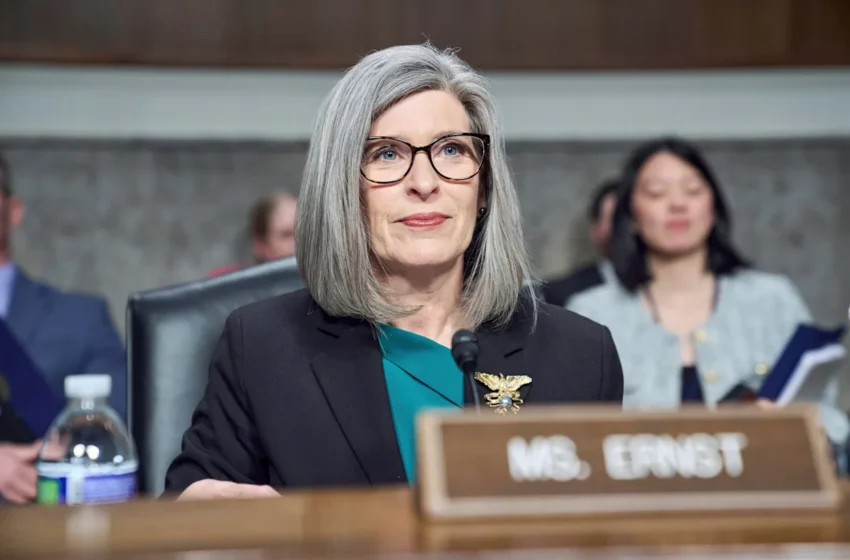Iowa Senator Joni Ernst won’t seek re-election – what to know

Sen. Joni Ernst
Republican Senator Joni Ernst of Iowa, a trailblazer and influential GOP figure, has announced she will not run for re-election in 2026. The news comes as a surprise to both political allies and rivals, given her rising influence in Washington and her track record of securing Iowa’s conservative base.
Her decision leaves a critical Senate seat up for grabs at a time when both parties are bracing for one of the most consequential election cycles in recent history. Ernst’s exit not only reshapes the future of Iowa politics but also shifts the balance of power in the national conversation leading up to 2026.
Ernst’s Decision Sparks Political Shockwaves
When Ernst first won her Senate seat in 2014, she made history as the first woman ever elected to represent Iowa in the U.S. Senate. Her victory speech, her military service background, and her strong grassroots support gave her national recognition. After securing re-election in 2020, many assumed she would run again in 2026 to solidify her role in shaping Republican policy.
However, according to reports from CBS News, Joni Ernst has privately signaled for months that she was weighing her future in Washington. The decision became public in late August 2025, and it immediately triggered reactions from party leaders. Some viewed it as a personal choice, while others speculated that growing frustrations with partisan gridlock may have influenced her.
Democrats, meanwhile, welcomed the news as an unexpected opening. While Iowa has leaned Republican in recent elections, an open seat provides a far better opportunity for Democrats to compete than running against an entrenched incumbent.
READ ALSO
Catelin Drey victory: Why her Iowa Senate win matters
Mark Teixeira: From MLB All-Star to Congressional Candidate – What to know
Impact on GOP Strategy and Senate Majority
The stakes are enormous. With the Senate split 53–47 in favor of Republicans, Iowa’s open seat could determine which party holds the majority in 2027. Losing Joni Ernst, who consistently outperformed statewide polls in past races, forces Republicans to defend a seat without the advantage of incumbency.
Strategists on both sides agree that Iowa will now be one of the most heavily funded races of the cycle. Millions in advertising dollars, campaign visits from presidential hopefuls, and national attention will likely flood into the state. For Republicans, the priority will be uniting around a strong candidate early to prevent a messy primary that could weaken their nominee.
Ernst’s reputation as a disciplined campaigner and reliable vote for GOP priorities means replacing her won’t be simple. Her departure removes not just a candidate but also a symbolic figure for Republican women in politics, further raising the stakes for her party.
Primary Battles and Potential Successors
The race to succeed Joni Ernst is already taking shape. On the Republican side, names like former State Senator Jim Carlin and several rising Iowa conservatives are being floated as contenders. Carlin has already filed paperwork, but others may soon join the race, creating what could be a fierce battle for the GOP nomination.
Democrats see an equally important opportunity. Potential candidates include Representative Josh Turek, State Senator Zach Wahls, Jackie Norris, and Nathan Sage, who bring a mix of progressive credentials and statewide appeal. If Democrats can unify around a single candidate, they may stand a chance at flipping a seat that has been in Republican hands for more than a decade.
Political analysts caution that Iowa’s rural-urban divide will play a decisive role. Rural counties remain strongly Republican, but Democrats believe they can make gains in Des Moines, Iowa City, and Cedar Rapids, giving them a pathway to victory if turnout surges.
Ernst’s Legacy in Iowa and Washington
Joni Ernst’s political career has been defined by historic firsts. Before joining the Senate, she served as a state senator and a county auditor, building her reputation as a no-nonsense conservative voice. A retired lieutenant colonel in the Iowa Army National Guard, Ernst brought military experience into the political arena, often speaking out on veterans’ affairs, defense, and fiscal responsibility.
In Washington, she rose through the ranks of Republican leadership, serving on influential committees and becoming one of the most prominent female voices in the GOP. Ernst also gained national attention for her memorable political ads, including her 2014 campaign spot that highlighted her Iowa farm background with the now-famous line about “castrating hogs.”
Her departure marks the end of a significant chapter in Iowa politics. Supporters view her as a pioneer who broke barriers for women in the Senate, while critics argue that her record reflected the GOP’s sharp partisan divides. Regardless of perspective, Ernst leaves behind a legacy that will shape Iowa’s political story for years to come.

